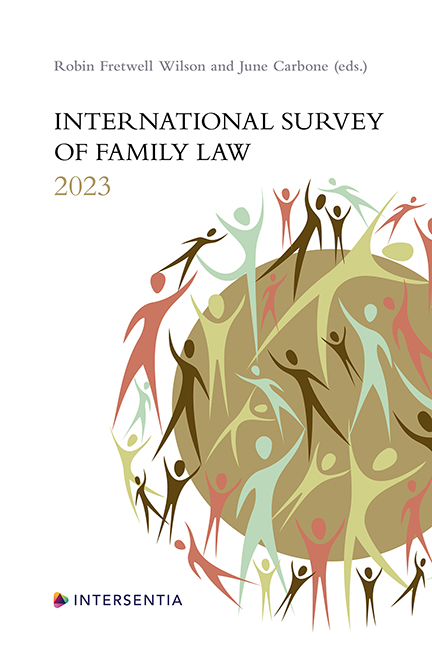Preface
Published online by Cambridge University Press: 03 April 2024
Summary
The 2023 edition of the International Survey of Family Law celebrates the International Society of Family Law‘s (ISFL) fiftieth anniversary. This first of two Jubilee editions begins with fascinating memoirs recounting the discussions that led to ISFL‘s creation, a conference in Opatija, Yugoslavia with tanks rumbling nearby on the eve of the Balkan War, the ISFL‘s expansion with meetings in Australia, Japan, and South Africa, and the role of the Society in anticipating and creating a foundation for family law reform.
This first Jubilee edition complements the more personal memoirs with retrospectives on long-term changes in family law across the globe. The chapters describe ‘a revolution in family law’ over the last half century as much of the world shifted from a unifocal emphasis on marriage to much more inclusive systems of family regulation. Individual chapters recount how, in Portugal, the democratic governments that followed the overthrow of Portugal‘s dictatorship embraced family law liberation, the transformation in Belgium in the legal definition of parenthood, and the Scottish developments broadening recognition of different family relationships. Other chapters consider the parallel developments in Japan and China, with the Japanese shifting from a patriarchal system of family regulation to greater recognition of gender equality, and from multigenerational families to nuclear families to individual expression, while the Chinese have reformed family law and procedure as part of the ‘rejuvenation of the Chinese nation’.
The chapters focused on more recent developments, in turn, report on the continuing process of family law reform and retrenchment. This first Jubilee edition reviews the incorporation of artificial intelligence into family law techniques, with a particularly trenchant comparison of the success in doing so with online platforms in Australia and the much greater resistance from practitioners in the Netherlands. Another chapter examines the evolution of the relationship between civil and Shariʿa courts in Israel, as Muslim litigants obtained the ability to choose between civil and religious tribunals. It describes the result as the ‘Islamisation of Israeli law’, with civil courts applying relatively conservative interpretations of shari ʿa law and the ‘Israelisation of shari ʿa law’, as the Islamic tribunals adopted relatively more liberal interpretations of the same religious principles.
- Type
- Chapter
- Information
- International Survey of Family Law 2023 , pp. v - viPublisher: IntersentiaPrint publication year: 2023

